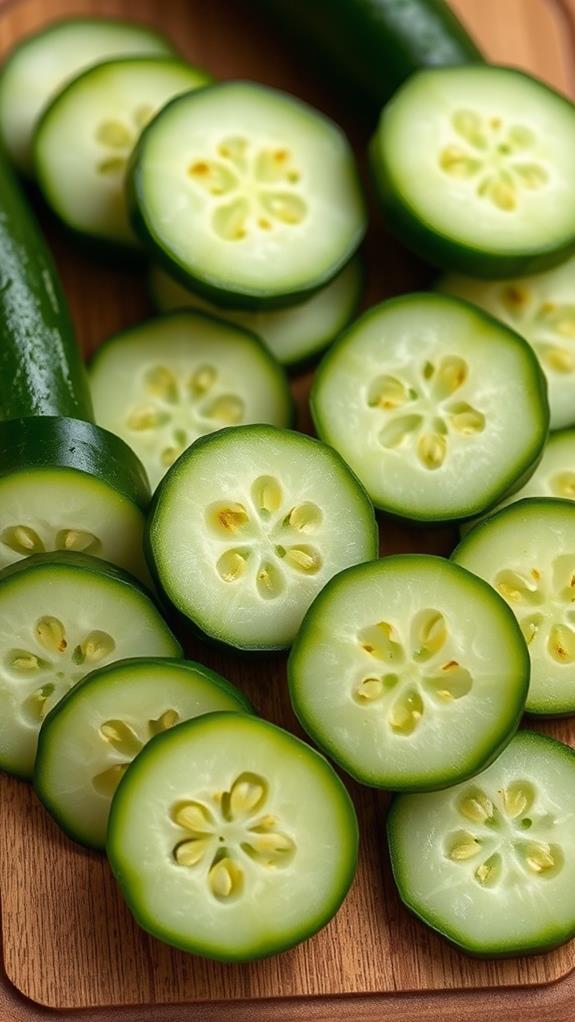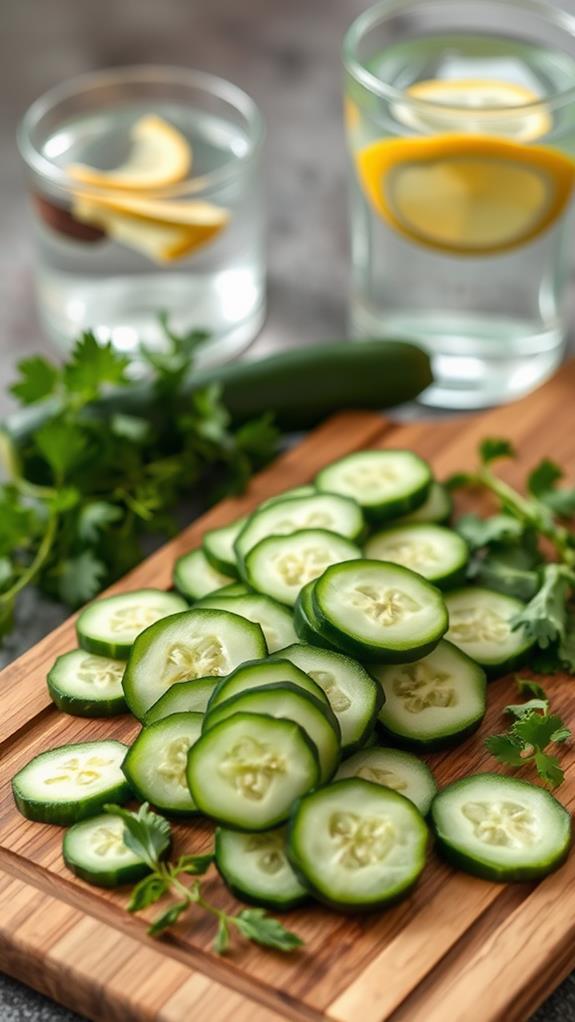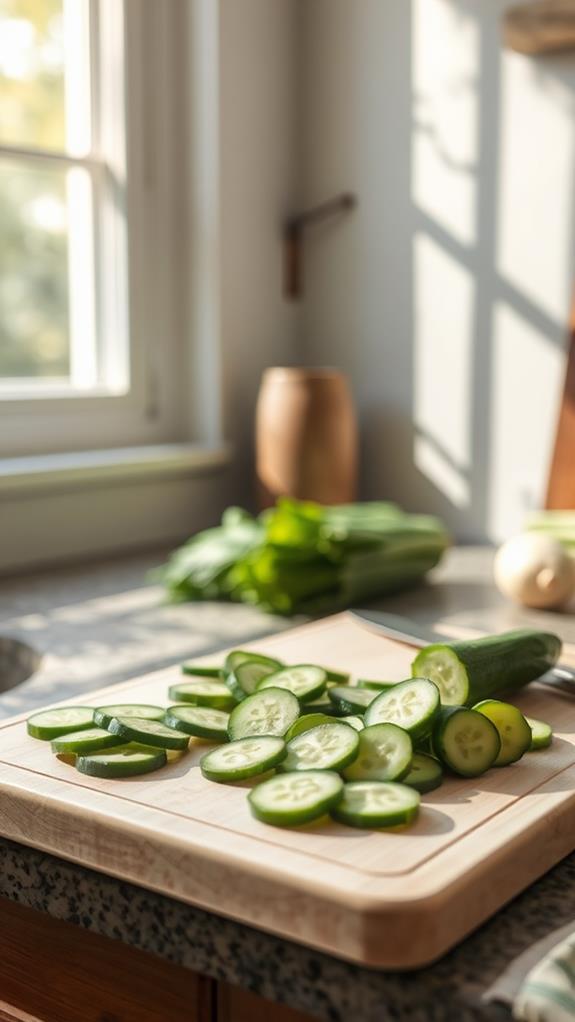Is It Safe to Eat Bitter Cucumber
Bitter cucumbers are generally safe to eat, but they can cause digestive discomfort in some people. The bitterness comes from compounds called cucurbitacins, which can lead to stomach upset or diarrhea if consumed in large amounts. To reduce bitterness, you can peel the cucumber, remove the stem end, and soak slices in salt water. Pregnant individuals and those with chronic health conditions should be cautious. While bitter cucumbers may have potential health benefits, such as anti-inflammatory properties, more research is needed. It's best to taste a small piece first and discard extremely bitter cucumbers. Proper growing and storage techniques can help prevent bitterness in your cucumbers.
This post may contain affiliate links. If you make a purchase through these links, I may earn a commission at no additional cost to you. Additionally, portions of this post may be generated using artificial intelligence (AI) technology. While we strive for accuracy, please be aware that AI-generated content may not always be perfect and should be fact-checked when necessary.
The Spatula Scoops
- Eating bitter cucumbers is generally safe, but may cause digestive discomfort in some individuals.
- Extremely bitter cucumbers should be discarded to avoid potential gastrointestinal distress.
- Peeling the cucumber and removing the stem end can reduce bitterness and make it safer to consume.
- Pregnant individuals and those with chronic health conditions should exercise caution when eating bitter cucumbers.
- Properly preparing bitter cucumbers, such as salting or soaking, can make them safer and more palatable to eat.
Understanding Cucumber Bitterness

Gardeners and cucumber enthusiasts often encounter bitter cucumbers, a common issue that can affect the taste of these popular vegetables. You might wonder why some cucumbers develop this unpleasant flavor while others remain crisp and delightful. The bitterness in cucumbers is primarily caused by compounds called cucurbitacins, which are naturally occurring chemicals found in the cucurbit family of plants. Similar to solanine in tomatoes, cucurbitacins serve as a natural defense mechanism against pests and diseases, but they can also make your cucumbers taste bitter when present in higher concentrations.
These compounds serve as a defense mechanism against pests and diseases, but they can also make your cucumbers taste bitter. Several factors can influence the production of cucurbitacins, including environmental stress, improper growing conditions, and genetic predisposition. Drought, extreme temperatures, and inconsistent watering can all contribute to increased bitterness.
You'll often find that the bitterness is concentrated in the skin and ends of the cucumber. Some varieties are more prone to bitterness than others, so choosing the right cultivar can make a difference. If you're growing cucumbers, maintaining consistent soil moisture, providing adequate nutrients, and harvesting at the right time can help minimize bitterness. Remember, while bitter cucumbers may not be pleasant to eat, they're generally safe for consumption unless the bitterness is extreme.
Causes of Bitter Cucumbers
While many factors can contribute to cucumber bitterness, several key causes stand out. Environmental stress plays a significant role in cucumber flavor. When plants experience drought, extreme temperatures, or inconsistent watering, they're more likely to produce bitter cucumbers. Genetics also influence bitterness; some cucumber varieties are naturally more prone to developing a bitter taste. Similar to strawberry leaves, cucumbers can be affected by pesticides and contaminants, which may contribute to their bitter taste.
Cucurbitacins, the compounds responsible for bitterness, tend to concentrate in certain parts of the cucumber. You'll often find higher levels near the stem end and just under the skin. Overripe cucumbers can develop increased bitterness as well.
Four common causes of bitter cucumbers:
- Inadequate watering practices
- Poor soil conditions or nutrient deficiencies
- Pest infestations or disease stress
- Improper harvesting techniques
To minimize bitterness, you should focus on proper plant care. Maintain consistent watering, maintain nutrient-rich soil, and harvest cucumbers when they're still young and firm. If you're growing cucumbers, consider choosing varieties bred for lower cucurbitacin levels. By understanding these factors, you can take steps to reduce the likelihood of encountering bitter cucumbers in your garden or at the market.
Health Implications of Bitter Cucumbers

The health implications of bitter cucumbers are often a concern for consumers. You might wonder if these unusually flavored veggies pose any risks to your well-being. While bitter cucumbers aren't typically harmful, they can cause some discomfort for certain individuals. Similar to uncooked rice consumption, eating large amounts of bitter cucumbers may lead to gastrointestinal distress. However, the risks associated with bitter cucumbers are generally less severe than those of raw rice.
The bitterness in cucumbers is primarily due to cucurbitacins, compounds that can act as natural pesticides. In small amounts, these substances aren't dangerous for most people. However, if you consume a large quantity of bitter cucumbers, you might experience digestive issues like stomach upset or diarrhea. It's worth noting that people with sensitive stomachs or digestive conditions may be more susceptible to these effects.
On the flip side, some studies suggest that cucurbitacins might have potential health benefits, including anti-inflammatory and anti-cancer properties. However, more research is needed to confirm these effects in humans. If you're pregnant or have a chronic health condition, it's best to consult your healthcare provider before consuming bitter cucumbers. As a general rule, if a cucumber tastes extremely bitter, it's safer to discard it rather than risk potential digestive discomfort.
Consuming Bitter Cucumbers Safely
Now that we've explored the potential health implications, let's focus on how to safely consume bitter cucumbers. If you're determined to eat them, there are several steps you can take to minimize risks and enhance palatability. First, always thoroughly wash the cucumbers to remove any surface contaminants. Next, taste a small piece to gauge the bitterness level. If it's too intense, consider peeling the cucumber, as the skin often contains the highest concentration of bitter compounds.
For particularly bitter cucumbers, you might want to try these techniques:
- Slice and salt the cucumber, letting it sit for 30 minutes to draw out excess moisture and bitterness
- Soak the slices in cold water with a splash of vinegar for 1-2 hours
- Cook the cucumber, as heat can reduce bitterness
- Pair it with strong flavors like garlic or lemon to mask the bitter taste
Preventing Cucumber Bitterness

Gardeners and cucumber enthusiasts can take several steps to prevent bitterness in their cucumbers before they even reach the kitchen. You'll want to focus on proper growing conditions and care to guarantee sweet, delicious cucumbers. First, choose cucumber varieties known for their mild flavor. Then, provide consistent watering and adequate sunlight to promote healthy growth.
Here's a table highlighting key factors in preventing cucumber bitterness:
| Factor | Impact | Prevention |
|---|---|---|
| Water stress | High | Regular, deep watering |
| Temperature | Medium | Use shade cloth in hot weather |
| Soil nutrients | High | Balanced fertilization |
To further reduce the chances of bitter cucumbers, you should harvest them when they're young and tender. Overripe cucumbers tend to develop more bitterness. Additionally, proper storage is essential. Keep your cucumbers in the refrigerator's crisper drawer, where they'll stay fresh and maintain their sweet flavor.
Frequently Asked Questions
Can Bitter Cucumbers Be Used in Skincare or Beauty Treatments?
Yes, bitter cucumbers can be used in skincare and beauty treatments. You'll find them in various DIY face masks and scrubs due to their astringent properties. They're believed to help tighten pores, reduce inflammation, and provide hydration to the skin. Some people also use bitter cucumber juice as a toner or add it to hair masks for potential benefits. However, it's important to patch test first, as some individuals may experience skin irritation or allergic reactions.
Are There Any Cultural or Traditional Uses for Bitter Cucumbers?
You'll find that bitter cucumbers have various cultural and traditional uses. In many Asian cuisines, they're prized for their unique flavor and health benefits. You might encounter them in traditional Chinese medicine, where they're used to treat skin conditions and digestive issues. In some Indian households, bitter cucumbers are hung over doorways to ward off evil spirits. They're also used in folk remedies for diabetes and blood pressure control. These cultural practices highlight the vegetable's significance beyond its culinary applications.
Do Bitter Cucumbers Have Different Nutritional Values Compared to Regular Cucumbers?
Bitter cucumbers pack a nutritional punch compared to their milder cousins. You'll find they're higher in vitamin C and antioxidants, which can boost your immune system and fight inflammation. They're also lower in calories and water content. However, their bitterness comes from compounds called cucurbitacins, which may have potential health benefits but can cause digestive discomfort in large amounts. If you're looking to diversify your nutrient intake, bitter cucumbers offer a unique nutritional profile worth considering.
Can Bitter Cucumbers Be Fed to Pets or Livestock?
You shouldn't feed bitter cucumbers to your pets or livestock. While some animals might tolerate them, the bitterness can be unpalatable and potentially harmful. Cucurbitacins, the compounds responsible for the bitter taste, can cause digestive issues in animals. It's best to stick to regular, non-bitter cucumbers or other approved vegetables for your animals' diets. If you're unsure about a specific animal's dietary needs, consult with a veterinarian for personalized advice on safe and nutritious food options.
Are There Any Varieties of Cucumbers That Are Naturally More Bitter?
Yes, there are cucumber varieties that are naturally more bitter. You'll find that some heirloom and wild cucumber types tend to have a stronger bitter taste. For example, the Indian Kachri cucumber and the African horned cucumber are known for their bitterness. The level of bitterness can also be influenced by growing conditions, such as temperature and water stress. If you're looking for less bitter options, you might prefer English cucumbers or Persian varieties, which are typically milder in flavor.
Conclusion
You've learned that bitter cucumbers aren't inherently dangerous, but they're not pleasant to eat. While you can safely consume them, it's best to avert bitterness through proper cultivation and storage. If you encounter a bitter cucumber, try peeling it or removing the ends. Remember, cucumbers should be crisp, invigorating, and mildly sweet. By understanding the causes of bitterness and taking preventive measures, you'll guarantee your cucumbers remain a delightful addition to your meals and salads.





